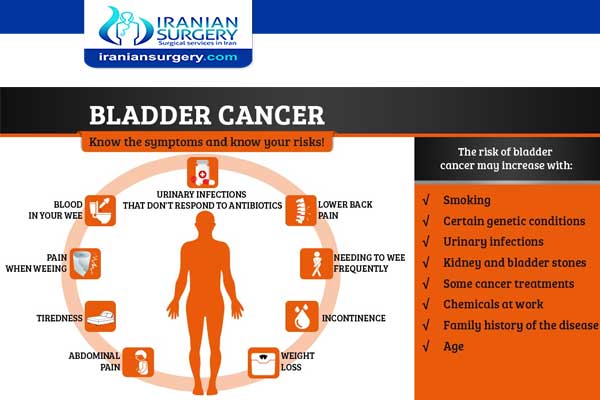Bladder Cancer Risk Factors
Risk factors for Bladder Cancer
A risk factor is anything that increases your chance of getting a disease such as cancer. Different cancers have different risk factors. Some risk factors, like smoking, can be changed. Others, like a person’s age or family history, can’t be changed.
Having a risk factor, or even many, does not mean that you will get cancer. And some people who get cancer may have few or no known risk factors.
Read more about : Bladder Cancer treatment
Read more about : What is Bladder Cancer?
Read more about : Orchiectomy surgery for prostate cancer
Factors that may increase bladder cancer risk include:
. Smoking. Smoking cigarettes, cigars or pipes may increase the risk of bladder cancer by causing harmful chemicals to accumulate in the urine. When you smoke, your body processes the chemicals in the smoke and excretes some of them in your urine. These harmful chemicals may damage the lining of your bladder, which can increase your risk of cancer.
. Increasing age. Bladder cancer risk increases as you age. Though it can occur at any age, most people diagnosed with bladder cancer are older than 55.
. Being male. Men are more likely to develop bladder cancer than women are.
. Exposure to certain chemicals. Your kidneys play a key role in filtering harmful chemicals from your bloodstream and moving them into your bladder. Because of this, it's thought that being around certain chemicals may increase the risk of bladder cancer. Chemicals linked to bladder cancer risk include arsenic and chemicals used in the manufacture of dyes, rubber, leather, textiles and paint products.
. Previous cancer treatment. Treatment with the anti-cancer drug cyclophosphamide increases the risk of bladder cancer. People who received radiation treatments aimed at the pelvis for a previous cancer have a higher risk of developing bladder cancer.
. Chronic bladder inflammation. Chronic or repeated urinary infections or inflammations (cystitis), such as might happen with long-term use of a urinary catheter, may increase the risk of a squamous cell bladder cancer. In some areas of the world, squamous cell carcinoma is linked to chronic bladder inflammation caused by the parasitic infection known as schistosomiasis.
. Personal or family history of cancer. If you've had bladder cancer, you're more likely to get it again. If one of your blood relatives — a parent, sibling or child — has a history of bladder cancer, you may have an increased risk of the disease, although it's rare for bladder cancer to run in families. A family history of Lynch syndrome, also known as hereditary nonpolyposis colorectal cancer (HNPCC), can increase the risk of cancer in the urinary system, as well as in the colon, uterus, ovaries and other organs.
Read more about : Pancreatic cancer
Read more about : Prostate Cancer Treatments Pros and Cons
Read more about : Cancer Treatment
Prevention
Although there's no guaranteed way to prevent bladder cancer, you can take steps to help reduce your risk. For instance:
. Don't smoke. If you don't smoke, don't start. If you smoke, talk to your doctor about a plan to help you stop. Support groups, medications and other methods may help you quit.
. Take caution around chemicals. If you work with chemicals, follow all safety instructions to avoid exposure.
. Choose a variety of fruits and vegetables. Choose a diet rich in a variety of colorful fruits and vegetables. The antioxidants in fruits and vegetables may help reduce your risk of cancer.
. Drink plenty of liquids. There's evidence that drinking a lot of fluids – mainly water – might lower a person’s risk of bladder cancer.
Read more about : prostate biopsy anesthesia
Read more about : Prostate cancer treatment


